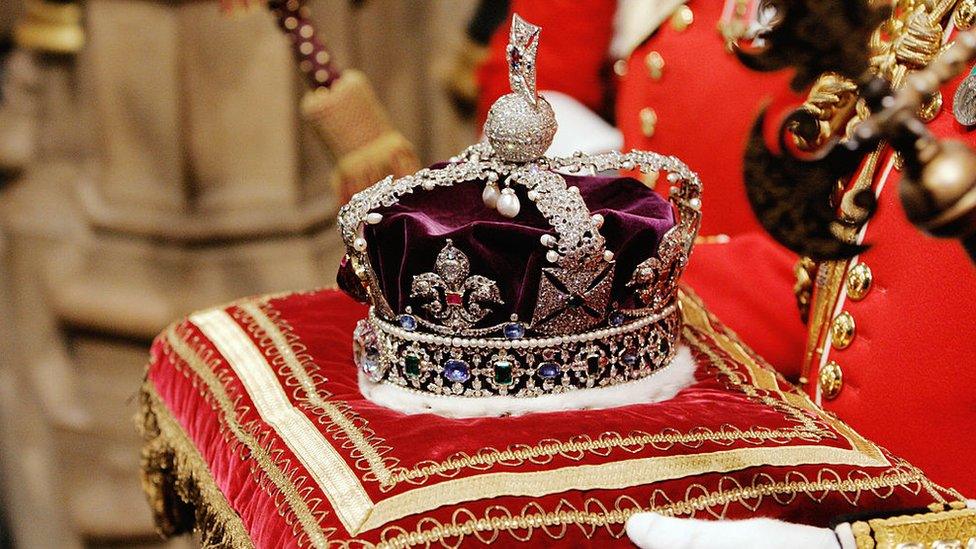King Charles III: What does a King do?
- Published

Queen Elizabeth II was head of state of the UK and head of the Commonwealth and had a number of different duties which she carried out.
When Her Majesty died last week, the throne passed immediately to the heir, Charles - the former Prince of Wales and now King Charles III - and he will take on those tasks.
These include receiving daily documents from the government and meeting the prime minister every week.
But what is a Head of State and what does a King do? Keep reading to find out more.
What is a Head of State?
As head of state. the UK monarch carries out a number of different duties
A Head of State is a person who embodies, or symbolises, a country. In a republic, they may be a President. In a monarchy, they may be a Queen or King.
In the UK, the British Monarchy is known as something called a constitutional monarchy. This means that they don't get involved or talk about their opinions on politics.
Their powers are more ceremonial and symbolic - the King or Queen isn't able to make and pass laws, that comes down to the UK Parliament.
As King, Charles is also now head of the Commonwealth.
The Commonwealth is a collection of 54 countries from around the world. In the past many of these nations were part of the British Empire.
Almost one in every three people in the whole world live in the Commonwealth, and it is made up of people of all faiths, races, languages, cultures and traditions.
For 14 of these countries - known as the Commonwealth realms - he is also now head of state there.
Daily despatch box
This picture from 1972 shows Queen Elizabeth II reading government documents from her red briefcase which she received every day
One of the main daily duties that King Charles III will take on is receiving daily documents from the government in a red leather briefcase - called a despatch box.
These documents include things such as briefings ahead of important meetings or documents that will need his signature.
Royal Assent
Parliament is where politicians meet to decide laws and make decisions for the UK
As head of state, King Charles will also have the final say on whether a bill becomes law - this is called Royal Assent.
What actually happens is that the monarch doesn't make a personal decision, but accepts the advice of the UK government - the last time Royal Assent was refused was back in 1708!
Royal Assent is the final stage of a bill's progress in Parliament and is essentially the monarch's official approval.
The bill then becomes an Act of Parliament, before becoming law.
Weekly meetings with the Prime Minister
King Charles III met with Liz Truss on Friday for his first audience with the Prime Minister
Every week, the monarch meets the Prime Minister, as all prime ministers are required to keep the King or Queen informed on government matters.
Queen Elizabeth II used to have these meetings every Wednesday at Buckingham Palace.
These meetings are completely private and there is no official record of what is said.
State opening and the King's Speech
King Charles III - known then as Prince Charles - read out this year's Queen's Speech on behalf of his mother, who had to miss the event due to mobility issues
As King, Charles will give a Speech - called the King's Speech - which is an important part of the State Opening of Parliament.
This is a bit like the start of a new school year for politicians.
The King's Speech is written by politicians and explains the government's plans for the coming year. The King reads the words that are written for him, and has no say in the government's plans.
It is usually read it out in front of members of the House of Commons and House of Lords, and there is normally one King's Speech every year.
Appointing a government
Liz Truss was appointed as the new UK prime minister after meeting the Queen at Balmoral last week
The leader of the political party that wins a general election is usually called to meet the monarch at Buckingham Palace, where they are formally invited to form a government.
The monarch also formally dissolves a government before a general election.
This is also the case when a prime minister decides to step down and a party elects a new leader, as happened last week when Boris Johnson travelled to see Queen Elizabeth II to offer his official resignation.
Her Majesty then had a meeting with Liz Truss, who had been elected the new Conservative leader. Ms Truss was officially invited by the Queen to form a government and made prime minister.
Other duties
The monarch normally leads the annual Remembrance event at the Cenotaph in London every November
In addition, the King will host visiting heads of state, and meet foreign ambassadors and high commissioners based in the UK.
He will also hold important meetings called the Privy Council every month, which is a meeting the monarch has with special advisers mainly made up of senior politicians.
King Charles III will also lead the annual Remembrance event in November at the Cenotaph in London.
He is also expected, like his mother Queen Elizabeth II did, to give the annual Christmas Day message on TV.
It's a tradition that was started in 1932 by the King's great-grandfather, King George V.
